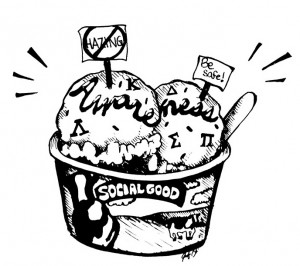Ben & Jerry’s must stand up against hazing
Ben & Jerry’s, the Vermont-based ice cream manufacturer and store, recently received complaints asking the company to change the name of one of its flavors, “Hazed & Confused.” In 2008, Harrison Kowiak died during a fraternity “hell week” hazing ritual at Lenoir-Rhyne University in Hickory, North Carolina. His mother, Lianne, was offended by the flavor name and suggested retitling the chocolate hazelnut ice cream to “Harrison’s Hazelnut Hooray,” in honor of her son. Instead of merely rechristening the flavor, Ben & Jerry’s should take this opportunity to speak out against hazing culture.
Ben & Jerry’s has already offered a statement to the family, and, in an email to the Huffington Post, made it clear that they never meant to associate the name with hazing rituals. “Ben & Jerry’s believes that hazing and bullying have no place in our society,” the company said in the email. “No individual, group or entity should benefit by marginalizing others.” The company’s spokesperson, Sean Greenwood, adds “The ice cream contains hazelnuts, so it was always meant as a pop culture reference to ‘Dazed and Confused,’” a Led Zeppelin song as well as a 1993 teen comedy.
Ben & Jerry’s is a socially minded company with clear political views and clever flavor names. They should take this unintentional association as an opportunity to put their ice cream where their press statement is and speak out against hazing. Given the company’s prominence, and popularity with college students, an anti-hazing campaign could make an impact. According to Bloomberg, the Kowiak’s late son was a Ben & Jerry’s fan; it seems that raising awareness about hazing culture would be a better tribute than simply renaming the ice cream.
Hazing is the use of peer pressure and other coercive means to make individuals participate unwillingly in activities. Though most commonly associated with fraternity and sorority initiation, hazing can take place in a number of contexts. Incidents range from psychological abuses to physical harm, such as forced displays of public nudity or forced, excessive consumption of alcohol. These rituals ostensibly initiate new members into an organization — bonding them together through traumatic experiences. Instead of using harmful tactics to create bonds, organizations should use positive experiences to form relationships.
Even though the blending of ice cream and social causes might seem like a stretch, Ben & Jerry’s has successfully combined company political views with ice cream in the past, in addition to using non-genetically modified ingredients and recyclable packaging.
In 2009, Chubby Hubby — a notoriously popular ice cream flavor — was renamed Hubby Hubby in support of the legalization of same-sex marriage in Vermont. According to Cone Communications, the ice cream name change and accompanying promotional campaign increased Freedom To Marry Web site traffic by 720 percent and prompted a 45 percent increase in signers to the nonprofit’s Marriage Resolution.
The same year, Ben & Jerry’s introduced Yes Pecan! ice cream to support President Barack Obama and raise funds for the Common Cause Education Fund. This month, the company unveiled Satisfy My Bowl, a flavor not currently available in the United States, which gives proceeds to Bob Marley’s 1Love Foundation. Despite the name’s allusion to marijuana, the company has not received significant adverse reactions.
Ben & Jerry’s seems to know when to rename and when to let the flavors speak for themselves. This should also be the case for Hazed & Confused. Despite complaints from the conservative One Million Moms group about their limited-run Schweddy Balls flavor, the ice cream company stood their ground. The ice cream name is a play off a 1998 Saturday Night Live skit featuring Alec Baldwin as baker Pete Schweddy and demonstrates the ice cream company’s love of of the show. According to the Huffington Post, the flavor in question soon became one of the company’s most popular. The immense customer response to the fudge-covered rum ball ice cream shows that the name was not risqué enough to put people off their ice cream. Similarly, their Karamel Sutra ice cream — with its clear sexual innuendo — has yet to evoke public criticism. Thus, Hazed & Confused’s unintentional association with hazing should not be grounds for the company to modify it.
In fact, Hazed & Confused should be used to promote social awareness of hazing culture. Now is the ideal time for Ben & Jerry’s to capitalize on this naming issue. Ben & Jerry’s has the resources and visibility to turn this public relations fiasco around by using their chocolate hazelnut ice cream for social good. Nothing could be sweeter.


